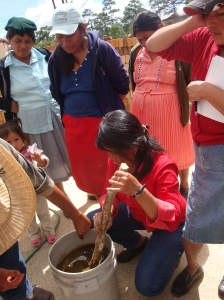Cositas is a small store in El Progreso, Yoro that sells materials and accessories for jewelry making. Just a few blocks from our El Progreso Branch Office and the central plaza, Maria, Lourdes and Jennifer work together to offer products and classes related to the making of jewelry. The three women’s expertise in training and design made them an ideal partner for our Product Innovation Workshops supported by Women’s Empowerment. Their knowledge and ability to work effectively with our clients resulted in a demand to bring them back for a second workshop in October after offering the first one in September.

I was thrilled to have been greeted by Lourdes and Jennifer immediately after arriving to their city!
In December during a visit with clients in the El Progreso and Choloma zones, I had been hoping to catch up with the women as well. As my luck would have it, the hotel I would be staying at is located right across the street from their business! Before I had even finished checking in, Lourdes had already spotted me and stopped over to greet me. While chatting with her and Jennifer I learned that upon the request of several of our clients, they had made the trip down to Intibucá to offer more of their jewelry making materials.
Trusting their expertise from my experience with them at the previous workshop, my visit to them had a second motive: getting a gift for someone I know who is interested in making jewelry. While Lourdes attended to other customers, Jennifer helped me out in bringing out the colors and styles that would best suit my friend and even sending me off with a couple different earring designs based on the beads I had bought as inspiration.

Many clients already had several pieces of jewelry ready to sell before the two day workshop had ended!
Just like with my friend, the making of jewelry gives our clients an additional source of income. Most clients who I spoke with seemed to plan on utilizing their new skill as a supplement to the businesses in which they have always invested loans. From women selling vegetables in the market to others selling cosmetics, these women already were identifying how they would get started making sales. And thanks to a new innovation developed out of the workshops by our Manager of Operations, they were able to get started right away.
The first workshop had inspired Oscar to create a new product: the Always Enterprising Loan! Many clients had been eager to get to work with their new skills but hadn’t been prepared to make material purchases at the workshop. For the second workshop in October, we tested this new product with great success. Clients were thrilled to be able to get started right away and several even spent their downtime between the workshop days working with the material purchased with the loan to produce the jewelry.
While the loans gave our clients a small investment to start up their businesses, many had already run out of the necessary materials less than two months after the workshop had been held! On their return trip down to Intibucá, the women made sales to 10-12 of our clients—more than one third of those in attendance! The funding provided by Women’s Empowerment and the relationship created between Adelante and Cositas creates a dynamic network in which three organizations organized around women can support each other’s mission. Maria, Jennifer and Lourdes’ friendly and instructive manner with our clients, combined with their excitement for our own program makes future work with them something to look forward to.




































